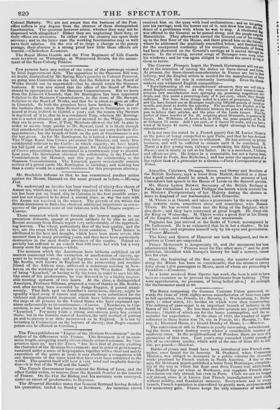We understand an invoice has been received of ninety-five chests
of Assam tea, which may be very shortly expected in this country. This tea has been put on board ship in Calcutta in the best possible order ; and has not required to be dried a second time, as was the case with the Assam tea received in the winter. The growth of tea within the British dominions in India has obtained additioual importance hi conse- quence of the present state of our relations with the Chluese empire.— courier.
Those countrica which have furnished the largest supplies to our precarious demands, appear at present unlikely to be able to aid us. Recent accounts from Russia report very unfavourably of the apprnach- ing harvest. The wheat, particularly that of the best quality, and the rye, are the crops which are in the worst condition. Their failure is attributed to the heat and drought, which have been more severe this summer than in many preceding years, and they have been particularly destructive in the most fertile provinces of the empire. Poland es- pecially has suffered to an extent that will leave her with but a very scanty store for exportatiou.—G/obe.
The soreness which the Americans have hitherto exhibited on all matters connected with the extinction or amelioration of slavery, ap- pears to be wearing away, and giving place to more elevated feelings. Mr. Scoble, well known in England as the persevering and resolute friend of the Afirican race, addressed a numerous meeting at New- haven on the working of the new system in the West Indies. Instead of being "Lynched," or having to fly the town in order to save his life, like seine of his predecessors, he was listened to hy a highly respect- able meeting upwards of two hours. At the close, a distinguished American, Professor Silliman, proposed a vote of thanks to Mr. Scoble ; and, after having been seconded by Judge Daggett, it passed unani- mously. That dark spot on Jonathan's escutcheon, slavery, might be speedily wiped away if reason and argument were substituted for the violence and disgraceful treatment which have hitherto accompanied the steps of all persons in the United States who have expressed opi-
nions unfavourable to its continuance.—Courier. [Nowhaveu, in Con- necticut, is one of the last places in America where anybody would be
"Lynched." For many years a strong anti-slavery party has existed there; but in the Eastern states of America, the only method of putting an end to slavery is as little understood as in England. It is not by lecturing in Connecticut on the horrors of slavery, that Negro emanci- pation can be effected in Carolina.]


























 Previous page
Previous page